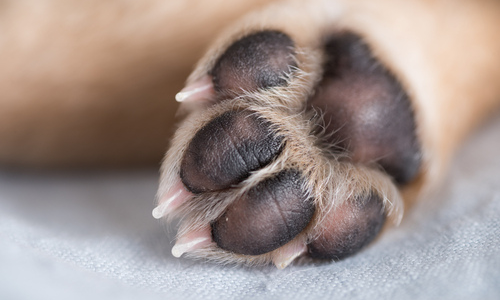
Common Paw Problems in Dogs
Healthy paws are essential to your pet's comfort and well-being. Paws offer protection against hazards, improve traction and balance, and serve as shock absorbers for the limbs. Regular home paw exams can help you spot these common paw issues.
Cracked Pads
Cracks may develop in the pads on the bottom of your dog's feet after exposure to cold temperatures, salt, chemicals, cleaners, or fertilizers. Cracks may bleed and might become infected without treatment. A moisturizing balm can help heal minor cracks. If cracks are deep or bleeding, your furry friend may need a prescription for antibiotic cream.
Booties, socks, paw balm, pad protectors, or other products can reduce the risk of cracks and keep your dog comfortable during walks and outdoor play sessions.
Allergies
Allergies may be responsible for your pet's red, swollen, smelly paws. Dogs often lick, bite, or chew the feet to try to ease the never-ending itching that occurs with allergies. Over-the-counter allergy medication or prescription steroid medication, depending on the severity of the allergies, can reduce itching and other symptoms. (Check with your pet's veterinarian before you give your pet any over-the-counter medication.) If your furry friend has developed a bacterial infection as a result of licking or biting the feet, antibiotics may also be needed.
Mats
Mats can form on the skin between the toes, particularly if your dog has long hair. Matted hair may sound like a minor problem, but mats tend to pull on the skin, causing discomfort and even infections in severe cases. Brushing the hair between the toes regularly and taking your dog to the groomer for an occasional trim can help prevent mats from forming.
Injuries
Your furry friend's paws may be tough but they can be injured by hot and cold surfaces, broken glass, sticks, or sharp stones. Nail injuries can also cause painful paw injuries. Long nails can easily become caught in cracks in flooring and tear away, resulting in pain and bleeding. Call your pet's veterinarian if you notice blisters, swelling, bleeding, limping, or embedded objects in the paws or paw pads. Emergency treatment can improve your pet's comfort and reduce the risk of infection.
Yeast Infection
Do your dog's feet smell like corn chips? A yeast infection may be the cause of this peculiar odor. The infection is more likely to occur if your dog has allergies, a hormonal imbalance, or immune system issues. Yeast infection symptoms can include itching, greasy skin, crusty paws, and swollen nail beds. Anti-fungal creams, wipes, and oral medication can clear the infection. It's also important to treat underlying conditions that may have caused the infection.
Demodectic Pododermatitis
Mange can affect your pet's entire body causing hair loss and crusty or scaly skin. Demodectic pododermatitis is confined to the feet and causes itching and hair loss on the paws. The condition occurs due to the overgrowth of tiny mites that live in hair follicles. Although these mites don't usually cause any problems normally, they can trigger mange symptoms if your pet has a weak immune system.
Treatment of demodectic pododermatitis may include soaking the feet in a dip solution, oral medication, and antibiotics to treat infections.
Pemphigus Foliaceus
Fluid-filled blisters or crusty skin on the paw pads can occur if your pet has pemphigus foliaceus (PF), an auto-immune condition. Eventually, your dog's pads may thicken and begin to crack. The condition happens when your pet's immune system attacks the outer layers of the paw pads. Corticosteroids will stop the blisters from forming and improve the condition of your pet's paws. Your dog may need to take the medication for the rest of his or her life.
Is your dog having paw problems or limping? Injuries and infections can make your furry friend miserable. We can determine the source of your pet's paw issues and offer treatment recommendations that will improve your pet's comfort. Contact our office to schedule a convenient appointment.
Sources:
PetMD: 9 Common Paw Problems in Dogs, 6/3/16
Pet Health Network: Pododermatitis in Dogs: Why Are My Dog’s Feet Red and Itchy

